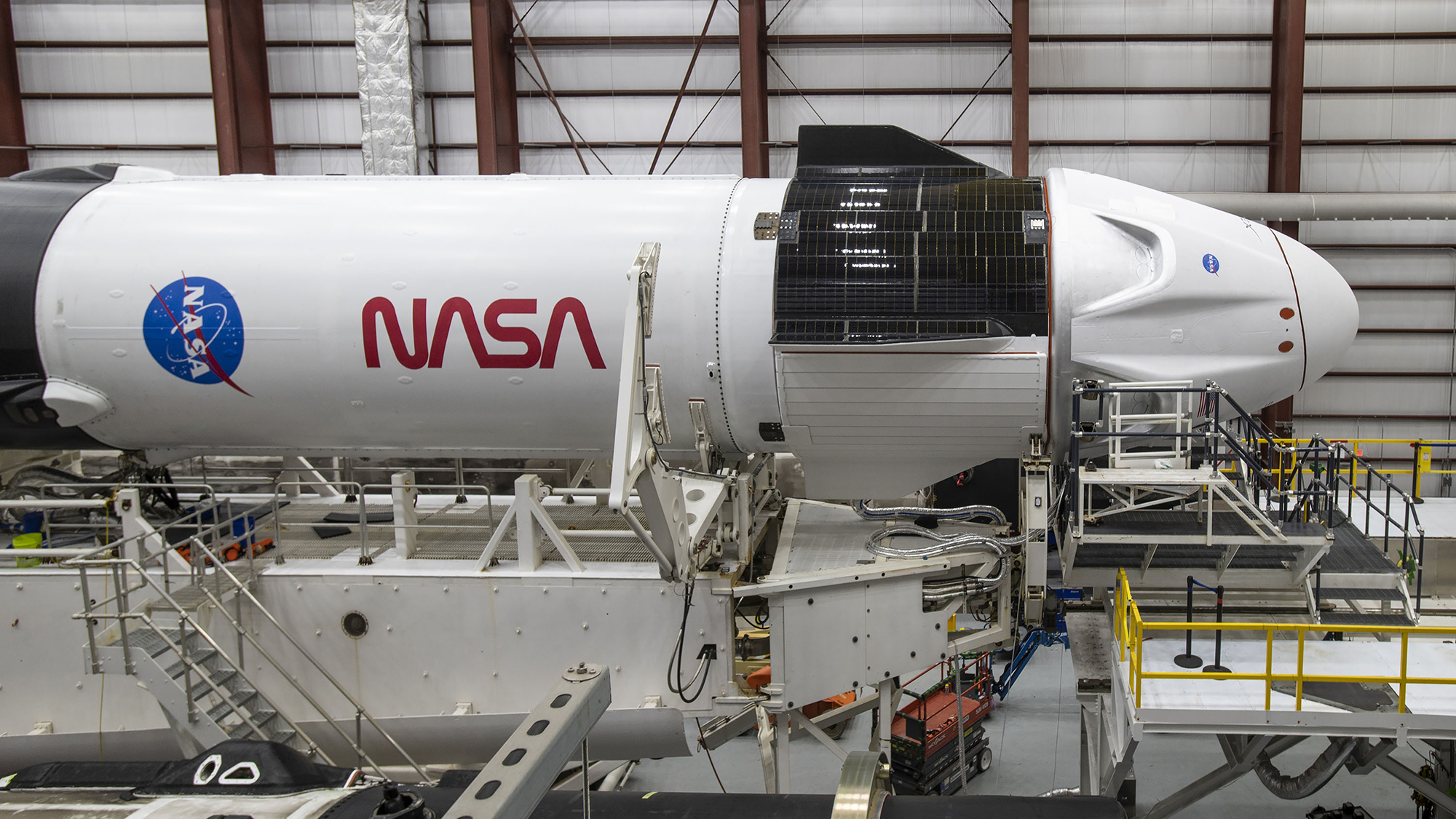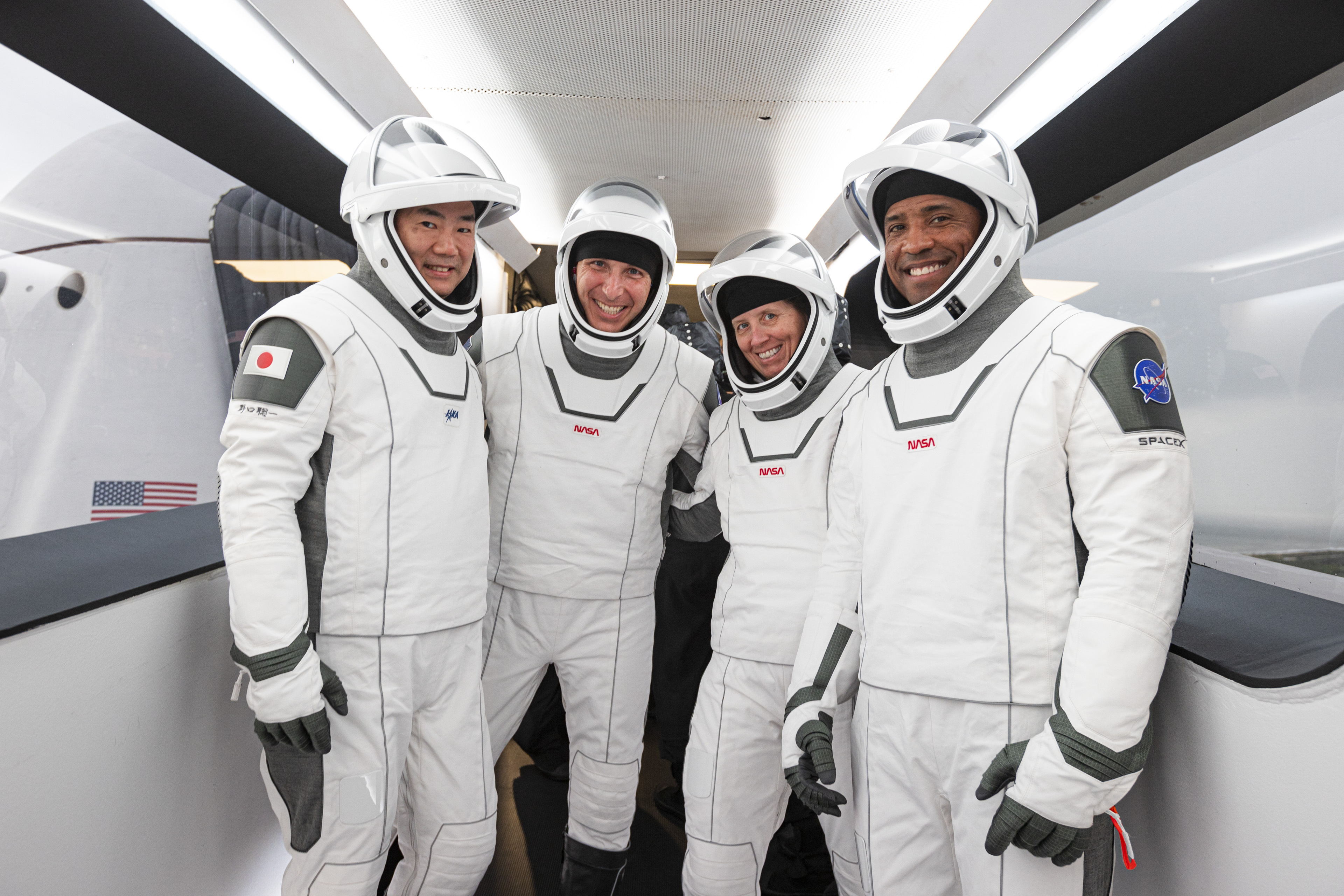SpaceX, NASA delay Crew-1 astronaut launch to Sunday due to rocket recovery weather
Unacceptable winds for the rocket booster's recovery are to blame, NASA says.

This story was updated at 7:41 p.m. EST.
SpaceX's first four-astronaut launch for NASA is going to have to wait at least an extra day to get off the ground.
A SpaceX Falcon 9 rocket and Crew Dragon capsule were slated to launch the astronauts to the International Space Station on Saturday (Nov. 14) from NASA's Kennedy Space Center in Florida. That mission, called Crew-1, will now launch no earlier than Sunday at 7:27 p.m. EST (0027 Nov. 16 GMT) due to weather delays from Tropical Storm Eta that affected SpaceX's drone ship rocket recovery operations. The launch itself had a promising 70% chance of good weather.
"Fundamentally, this was an issue of getting the drone ship there in time," Benji Reed, SpaceX's senior director for human spaceflight programs, told reporters in a Friday press conference. "The weather was such because of this tropical storm, that we couldn't get the drone ship to leave in time and get there."
Live updates: SpaceX's Crew-1 astronaut launch for NASA
SpaceX uses automated drone ships as floating landing pads in the Atlantic Ocean to recover the first stage of its Falcon 9 rocket for later reuse. But good weather is needed for those operations. Recovering the Crew-1 mission's first stage is vital since the booster will be used on SpaceX's next astronaut flight for NASA, which is due to launch March 30.
"This booster is very important for us," NASA's Commercial Crew Program manager Steve Stitch said. " We're going to reuse the first stage that we're flying on Crew-1 for the Crew-2 mission coming up in the springtime."
Breaking space news, the latest updates on rocket launches, skywatching events and more!
Reed also said that SpaceX and NASA currently have no concerns related contact-tracing in response to a question about SpaceX CEO Elon Musk's announcement today that he'd received two positive tests for the coronavirus responsible for COVID-19, as well as two negative tests.
"I can assure everyone that we're looking good for the Crew-1 launch and for all the personnel that are involved," Reed said.
Update: Due to onshore winds and recovery operations, @NASA and @SpaceX are targeting launch of the Crew-1 mission with astronauts to the @Space_Station at 7:27 p.m. EST Sunday, Nov. 15. The first stage booster is planned to be reused to fly astronauts on Crew-2. #LaunchAmericaNovember 13, 2020
SpaceX's Crew-1 mission will launch NASA astronauts Victor Glover, Mike Hopkins, Shannon Walker and Japan Aerospace Exploration Agency astronaut Soichi Noguchi on what will be a six-month mission at the International Space Station.
The mission is the first operational flight of SpaceX's Crew Dragon spacecraft for NASA, and the first four-person flight for the company. (SpaceX's first crewed flight test for NASA in May carried only two astronauts.)
The mission was originally scheduled to launch on Oct. 23, then pushed back to Oct. 31. Last month, SpaceX and NASA postponed the flight to mid-November to allow time to replace two rocket engines on the mission's Falcon 9 booster.
Related: SpaceX's Crew-1 astronaut mission in photos
A 24-hour launch delay means a longer trip to the space station for the Crew-1 astronauts.
If SpaceX had launched the mission Saturday, the Crew-1 astronauts would have reached the station early Sunday morning after an 8.5-hour trip due to the location of the station at that time. Because of the one-day delay, the Crew-1 mission will now take about three times longer.
"It's about 27 hours from launch to dock," Steve Stitch, NASA's Commercial Crew Program manager, told reporters Tuesday (Nov. 10) in a press briefing. "And that's just due to the way the orbital mechanics line up."
That extra time means the Crew-1 astronauts will spend the night in their Crew Dragon, which they've named "Resilience."
"It gives them more opportunity to try out Dragon," Reed said, adding that SpaceX is also eager to see how the capsule performs with a full crew complement during that time. "I'm pretty sure there are a couple of broadcast events that they'll be able to do with this time period, and you know, checking things out seeing the Earth go by."
The weather forecast for a Sunday launch is only slightly less favorable than on Saturday, with a 60% chance of good weather, according to a U.S. Space Force forecast.
If SpaceX is unable to launch on Sunday, the Crew-1 astronauts will have to wait for three more days, until Wednesday (Nov. 18), to try again. That's because of a few things: First, two cosmonauts currently on the space station will perform a spacewalk on Monday, so the station's current three-person Expedition 64 crew will be busy. A launch on Tuesday would actually take longer to reach the station than Sunday's flight profile, Reed added.
"So the next opportunity would be Wednesday, Thursday Friday in the middle of next week," he said.
SpaceX is one of two commercial companies with multi-billion-dollar contracts to fly astronauts to and from the space station for NASA. The other company, Boeing, will launch astronauts on its own Starliner spacecraft using United Launch Alliance Atlas V rockets.
SpaceX's first crewed launch for NASA lifted off on May 30. That mission, called Demo-2, lasted two months and ferried two astronauts to and from the station.
You can watch SpaceX's Crew-1 launch for NASA live here at Space.com on Sunday beginning at 3:15 p.m. EST (1915 GMT).
Editor's note: This story was updated to include new comments from SpaceX and NASA on the launch delay for the Crew-1 mission.
Email Tariq Malik at tmalik@space.com or follow him @tariqjmalik. Follow us @Spacedotcom, Facebook and Instagram.

Tariq is the award-winning Editor-in-Chief of Space.com and joined the team in 2001. He covers human spaceflight, as well as skywatching and entertainment. He became Space.com's Editor-in-Chief in 2019. Before joining Space.com, Tariq was a staff reporter for The Los Angeles Times covering education and city beats in La Habra, Fullerton and Huntington Beach. He's a recipient of the 2022 Harry Kolcum Award for excellence in space reporting and the 2025 Space Pioneer Award from the National Space Society. He is an Eagle Scout and Space Camp alum with journalism degrees from the USC and NYU. You can find Tariq at Space.com and as the co-host to the This Week In Space podcast on the TWiT network. To see his latest project, you can follow Tariq on Twitter @tariqjmalik.

